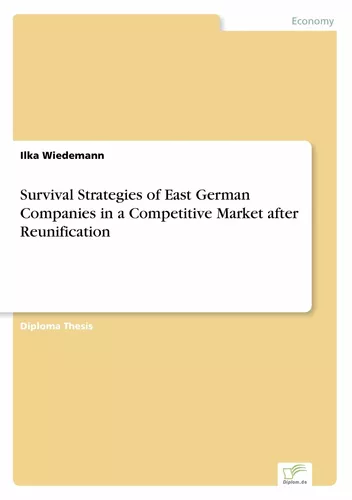Skip to the end of the images gallery Navigation umschalten
Skip to the beginning of the images gallery Navigation umschalten

Survival Strategies of East German Companies in a Competitive Market after Reunification
Paperback
112 Seiten
ISBN-13: 9783832496340
Verlag: Diplom.de
Erscheinungsdatum: 15.06.2006
Sprache: Englisch
Farbe: Nein
74,00 €
inkl. MwSt. / portofrei
Ihr eigenes Buch!
Werden Sie Autor*in mit BoD und erfüllen Sie sich den Traum vom eigenen Buch und E-Book.
Mehr erfahrenInhaltsangabe:Introduction:
The speed with which the Berlin Wall fell on the 9 November 1989 was both surprising and inspiring. No longer would the people of East Germany be held captive under a repressive regime that deprived them, not only of western commodities, but of the most fundamental of human needs, the freedom to thrive.
On 18 May 1990, politicians from the East and West signed a treaty creating an economic and social union. This was followed by the Treaty of Unification on 31 August 1990. The dream of one Germany had become a reality. It was now up to the German people to build a unified economy, a task that posed difficult questions most importantly, what to do with the state owned businesses that comprised the former GDR (German Democratic Republic).
The former states of the GDR contain some of the highest growth regions in Europe. Despite this, there is social instability and high unemployment. As of October 2003, the unemployment rate in East Germany was 17.3% compared with 8.0% for the West, and 8.1% for the European Union.
While there is a necessity to improve the situation for all of Germany, many hurdles remain. In the case of unified Germany, Deutschland einig Vaterland is more than a slogan of unity; it is a statement for economic survival.
The aim of this thesis will be to explore the following questions:
How did three East German companies the Rotkäppchen sparkling wine company, the Florena cosmetics company, and the Fit detergent company survive and even thrive after reunification? How did the Treuhand Anstalt (THA), or Trust Agency, help these companies, and what affect has this had on the German economy? What were some peripheral reasons for economic survival, including government incentives, global economic expansion during the 1990s, and ostalgia?
What were some East German companies that did not survive, and why did they fail when others succeeded? How could these survival strategies be applied to other companies in other nations and what are the lessons for the future?
In answering these questions, it will be necessary to explore the history, not only of the three companies, Rotkäppchen, Florena, and Fit, but also of the East German market.
Due to the complexity of this topic, however, this thesis will remain focused on three main survival strategies. These will include how finding a niche market, using mergers and acquisitions, and using company and product diversification have helped companies […]
The speed with which the Berlin Wall fell on the 9 November 1989 was both surprising and inspiring. No longer would the people of East Germany be held captive under a repressive regime that deprived them, not only of western commodities, but of the most fundamental of human needs, the freedom to thrive.
On 18 May 1990, politicians from the East and West signed a treaty creating an economic and social union. This was followed by the Treaty of Unification on 31 August 1990. The dream of one Germany had become a reality. It was now up to the German people to build a unified economy, a task that posed difficult questions most importantly, what to do with the state owned businesses that comprised the former GDR (German Democratic Republic).
The former states of the GDR contain some of the highest growth regions in Europe. Despite this, there is social instability and high unemployment. As of October 2003, the unemployment rate in East Germany was 17.3% compared with 8.0% for the West, and 8.1% for the European Union.
While there is a necessity to improve the situation for all of Germany, many hurdles remain. In the case of unified Germany, Deutschland einig Vaterland is more than a slogan of unity; it is a statement for economic survival.
The aim of this thesis will be to explore the following questions:
How did three East German companies the Rotkäppchen sparkling wine company, the Florena cosmetics company, and the Fit detergent company survive and even thrive after reunification? How did the Treuhand Anstalt (THA), or Trust Agency, help these companies, and what affect has this had on the German economy? What were some peripheral reasons for economic survival, including government incentives, global economic expansion during the 1990s, and ostalgia?
What were some East German companies that did not survive, and why did they fail when others succeeded? How could these survival strategies be applied to other companies in other nations and what are the lessons for the future?
In answering these questions, it will be necessary to explore the history, not only of the three companies, Rotkäppchen, Florena, and Fit, but also of the East German market.
Due to the complexity of this topic, however, this thesis will remain focused on three main survival strategies. These will include how finding a niche market, using mergers and acquisitions, and using company and product diversification have helped companies […]
Eigene Bewertung schreiben










Es sind momentan noch keine Pressestimmen vorhanden.